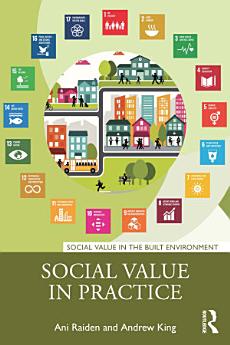Social Value in Practice
អំពីសៀវភៅអេឡិចត្រូនិកនេះ
The book connects social value to the global Sustainable Development Goals (SDGs) and presents an insight into the many and different practical ways in which individuals and organisations can make a positive impact towards resolving the ‘people, planet and prosperity’ agenda:
- 'Good work' – good practice in managing people, including working conditions, and equality, diversity, and inclusion
- Education, skills, and employment, including apprenticeships and enhancing the industry image
- Social procurement and circular supply chains
- Strategic partnerships and social enterprises
- Community development, regeneration, and placemaking
- Construction consultancy
- Architecture, design, and construction
- Assessing and measuring social value.
Reflective practitioners can pick it up, turn to a chapter, and learn something they can use right away. Through numerous practical examples and think pieces, this book can help readers learn how to create social value, how to improve and build upon current practice, and how to co-create social value in partnership with clients and the supply chain. The authors aim to empower and inspire stakeholders to engage with new ideas and create more value for those using the built environment. This book is a must read for all those involved in procuring, tendering, planning, designing, developing, funding, building, working in, and managing the built environment.
អំពីអ្នកនិពន្ធ
Ani Raiden is a Senior Lecturer in HRM at Nottingham Business School, Nottingham Trent University, with a well-established research track record. Ani is a certified Carbon Literacy Trainer, and the principles of sustainability are integral to her research on managing people, quality of working life, social value, and construction and project management. In 2009 Ani co-authored a book on people resourcing with Professors Andy Dainty and Richard Neale, and in 2019 she published a first of its kind text on social value with Martin Loosemore, Andrew King, and Chris Gorse: Social Value in Construction, Routledge.
Andrew King runs Soul Value (https://www.soulvalue.co.uk/), a built environment consultancy that helps clients simply and effectively get to grips with social value. He has been involved in construction from a young age, having gained experience working in the family construction business before working as a Quantity Surveyor, running his own surveying business and helping develop a relationship-based supply chain strategy for one of the UK’s largest contractors. His research, lecturing, and writing increasingly focuses on social value and apprenticeships and he is a Workplace Tutor for Quantity Surveying Degree Apprenticeship students at Nottingham Trent University.






